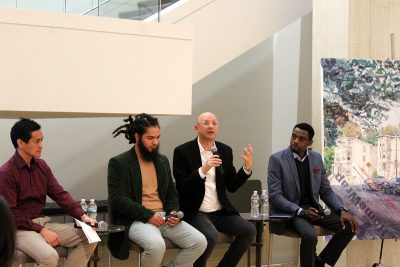
The Museum of Fine Arts welcomed an eager group of visitors Wednesday night, who were combatting the cold. The group gathered at the museum for a conversation, part of the “City Talks” series, that featured stories about migration and the theme of belonging.
Audience members ranged in diversity of gender, age and ethnicity. Four speakers stood before the audience members, including Penn Loh, the panelist moderator. Loh, a senior lecturer and director of the Master of Public Policy Program at Tufts University, began the discussion with his personal migration story.
Loh, who said his parents immigrated from Taiwan, said that the opportunity to start a new life in the United States might not be a possibility in today’s political landscape.
The panelists — Mr. Body Homicile, Adam Strom and Wilton Tejeda — were introduced by Loh and shared their distinctive perspectives.
Tejeda’s artwork dominated the massive space. The artist uses his work to critique gentrification, or rather the act of forcing communities out of a space. His artwork drew attention from the visitors in the discussion space. Using acrylic and oil, Tejeda created a visualization of gentrification in Boston.
Inspired by his personal experiences of the shifting landscape on Jackson Street, Tejeda’s painting juxtaposes two buildings — a white three-decker apartment building and a modernist house. He overlapped this image with typography, including the word “Tyvek,” which he said is meant to represent wealth and materialism.
Gentrification and displacement heavily affect Boston, particularly in the Roxbury area. Loh elaborated on the city’s issue, speaking about the history of the West End.
The West End, a diverse neighborhood comprised of many African-American, Jewish and Irish residents, decided to implement an urban renewal project in the 1950s. The project led to the displacement of immigrant communities.
Homicile emphasized the shifting culture in Roxbury and Mattapan where many Jewish and African-American families resided. He explained this period of transition created hostile environments.
Loh called individuals in the communities experiencing erasure “invisibilized.” He encouraged the crowd to ask themselves if raising the cost of living in gentrified areas has any benefits.
“Social entrepreneurs,” or migrants who create vibrant communities filled with small businesses, religious centers and all other organizations, are suppressed by lack of capital and face eradication, according to Loh.
“The stories that don’t get told are the folks who are doing all the other work that it takes to support the industries,” Loh said in an interview. “The stories of those people become invisible, and those are the folks that are the most vulnerable to displacement.”
Strom, director of Re-Imagining Migration, said on the panel that as a fourth generation Jewish-American, he can recall feeling like he didn’t belong as a Jewish individual living in a predominately Irish community.
“We need safe spaces where people feel like they’re valued as human begins and stories matter, but that alone is not enough,” Loh said in an interview. “We need to have folks come across differences as well.”
Strom then raised the question, “What makes cities wonderful?” To him, it was “finding a crowd … finding a place to be alone.”
“We make the city … it’s the people,” Loh said in the talk. “We have a right to the benefits because we are a part of creating it.”
Loh explained how college students increase housing competition in an interview.
“Students in particular, when they are not able to get dorm housing, they are able to go out and compete in the housing market as well,” Loh said, “and outcompete the family that might otherwise have lived there.”
Young professionals also help perpetuate gentrification, according to Loh.
“Institutions play a role in fueling gentrification,” Loh said. “To the extent that these are major employers attracting folks that are going to make decent income to the area, attracting more folks to compete in the housing market.”
Emily Cioch, a junior in Boston University’s College of Arts and Sciences, attended the talk and said it was very eye-opening for her considering she is a college student.
“It allowed me to see Boston from someone else’s perspective and understand what life is like beyond campus,” Cioch said.

















































































































